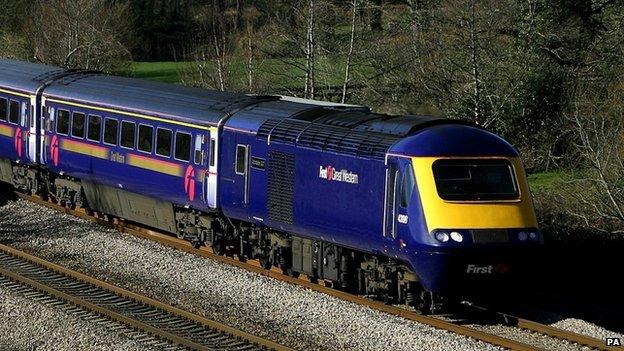Great Western electrification scheme 'one year behind schedule'
- Published

The job is bigger and harder than expected, but also dramatically more expensive, sources say
Plans to modernise railways in the Thames Valley are a year behind schedule after they proved to be "dramatically more expensive" than first thought.
The predicted cost to transform the old Great Western route has climbed from ТЃ640m to ТЃ1.74bn, the ДѓЯѓДЋУН has learned.
Senior industry executives have said the plans to complete the work by the end of 2016 will not be met.
Network Rail said work was "progressing well" but schedules could change.
Overhead wires need to be fitted between Reading and Oxford so that modern trains can run on the line and carry more passengers, ease overcrowding, and improve rail times.
New trains are being shipped from Japan, with the first due to arrive in two weeks.
But they cannot be tested on the Great Western line because the power supply is not in place.
Sources have told the ДѓЯѓДЋУН the job is bigger and harder than expected, but also dramatically more expensive.
Paul Clifton, ДѓЯѓДЋУН South transport correspondent
The first of a new fleet of electric trains is on its way from a factory in Japan, raising the prospect of brand new trains standing idle in sidings.
Officially, Network Rail is still aiming for the wires to be working late next year. But note the careful choice of language. "Aiming for" is not the same as promising.
I've now been told by four separate sources the target will not be met.
One told me the project was in complete disarray and the wires will not be up until 2017.
This matters because other investment is dependant on the overhead wires being in place 18 months from now.
Putting up the wires is the central element. If that runs badly behind, the effect will be like a knocking over the first of a row of dominoes running through the rail industry.
Network Rail described it as the "biggest and most complex electrification scheme for more than a generation".
It said the work was a "major investment" in the region's railways which would benefit millions of rail users.
"While work is progressing well and we're aiming for an end of 2016 target for the Thames Valley," it said, "the programme is subject to change and alteration as the scope and needs of the overall project also change."
- Published13 August 2014
- Published11 April 2014